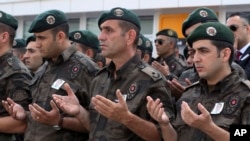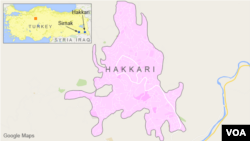Turkey's military said Tuesday warplanes had carried out airstrikes against 17 Kurdish rebel targets in southeastern Turkey.
A statement said the strikes focused on the Kurdistan Worker's Party (PKK) in Hakkari province, which borders Iraq and Iran.
The airstrikes follow deadly attacks Monday blamed on the PKK that killed nine people in neighboring Sirnak province and in Istanbul. Overnight, Kurdish rebels attacked a military post in Sirnak, killing a Turkish soldier.
Turkey has been bombing PKK targets in southeastern Turkey and northern Iraq since late July after announcing a new anti-terror offensive. Turkish forces also are targeting Islamic State militants across the border in Syria, but most of the raids have hit Kurdish positions.
Turkish newspapers have captured the unrest with bold headlines, with one saying, "Chaos," and another, "Attacks come from everywhere."
One Turkish security analyst, Nihat Ali Ozcan, said the violence is likely to extend for a while and is rooted in the country's political fortunes.
"The peace process came to a halt after the pro-Kurdish party strengthened its position and the ruling party was weakened and [President Recep Tayyip] Erdogan's chance to realize his project [a U.S. style presidential system] ran out," said Ozcan.
"The government chose to follow the path of violence to find a strategic way out and PKK also chose violence to take back the opportunities it lost during this process. Therefore, these hostilities are likely to continue for a while. How will this develop? This depends on whether the government will be formed or whether there will be early polls," said Ozcan.
IS targets
Turkish forces also are targeting Islamic State militants across the border in Syria.
The United States and European Union called on Turkey last week to show restraint in its bombing of the Kurds, saying the country had a right to defend itself but that the response should be "proportionate."
The U.S. State Department said the PKK should renounce violence and engage Turkey in talks.
The PKK has been fighting Turkey since 1984 in a conflict that has left 40,000 people dead.
Iranian FM delays visit
Meanwhile, Turkish officials announced Iranian Foreign Minister Mohammad Javad Zarif has postponed his visit to Turkey.
Zarif was scheduled to hold talks Tuesday with his Turkish counterpart, Mevlut Cavusoglu. It would have been his first visit to Turkey since last month's landmark deal on Iran's nuclear program.
Turkey's Foreign Ministry said the visit has been postponed until an unspecified date in the future but did not provide a reason for the delay.
Turkish media reports said Zarif planned to brief Turkish leaders on an Iranian plan to end the Syrian civil war.
Some material for this report came from AP.







